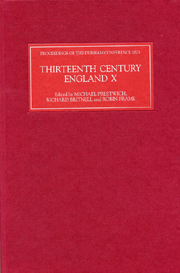Book contents
- Frontmatter
- Contents
- PREFACE
- ABBREVIATIONS
- The Meetings of Kings Henry III and Louis IX
- Counting the Cost: The Financial Implications of the Loss of Normandy
- Networks of Markets and Networks of Patronage in Thirteenth-Century England
- Three Alien Royal Stewards in Thirteenth-Century England: The Careers and Legacy of Mathias Bezill, Imbert Pugeys and Peter de Champvent
- The Eyre de terris datis, 1267–1272
- Joan, Wife of Llywelyn the Great
- Town and Crown: The Kings of England and their City of Dublin
- English Landholding in Ireland
- The Reception of the Matter of Britain in Thirteenth-Century England: A Study of Some Anglo-Norman Manuscripts of Wace's Roman de Brut
- Fearing God, Honouring the King: The Episcopate of Robert de Chaury, Bishop of Carlisle, 1258–1278
- Cloistered Women and Male Authority: Power and Authority in Yorkshire Nunneries in the Later Middle Ages
- Taxation and Settlement in Medieval Devon
- Clipstone Peel: Fortification and Politics from Bannockburn to the Treaty of Leake, 1314–1318
- Royal Patronage and Political Allegiance: The Household Knights of Edward II, 1314–1321
- ‘Edward II’ in Italy: English and Welsh Political Exiles and Fugitives in Continental Europe, 1322–1364
Royal Patronage and Political Allegiance: The Household Knights of Edward II, 1314–1321
Published online by Cambridge University Press: 12 September 2012
- Frontmatter
- Contents
- PREFACE
- ABBREVIATIONS
- The Meetings of Kings Henry III and Louis IX
- Counting the Cost: The Financial Implications of the Loss of Normandy
- Networks of Markets and Networks of Patronage in Thirteenth-Century England
- Three Alien Royal Stewards in Thirteenth-Century England: The Careers and Legacy of Mathias Bezill, Imbert Pugeys and Peter de Champvent
- The Eyre de terris datis, 1267–1272
- Joan, Wife of Llywelyn the Great
- Town and Crown: The Kings of England and their City of Dublin
- English Landholding in Ireland
- The Reception of the Matter of Britain in Thirteenth-Century England: A Study of Some Anglo-Norman Manuscripts of Wace's Roman de Brut
- Fearing God, Honouring the King: The Episcopate of Robert de Chaury, Bishop of Carlisle, 1258–1278
- Cloistered Women and Male Authority: Power and Authority in Yorkshire Nunneries in the Later Middle Ages
- Taxation and Settlement in Medieval Devon
- Clipstone Peel: Fortification and Politics from Bannockburn to the Treaty of Leake, 1314–1318
- Royal Patronage and Political Allegiance: The Household Knights of Edward II, 1314–1321
- ‘Edward II’ in Italy: English and Welsh Political Exiles and Fugitives in Continental Europe, 1322–1364
Summary
By 1321 the company of royal household knights that Edward II had created in the years after his defeat at the battle of Bannockburn had largely disintegrated. Instability and disloyalty are two striking features of the king's knightly retinue in this period. Of the fifty-two household bannerets and knights retained by Edward in 1316, only eight were still members in 1322. In total, twenty-five knights who served in the household between 1314 and 1321 ultimately fought against the king in the civil war. Many of these former royal adherents were leaders of the factions that emerged in armed opposition to him. There is no question that Edward was entitled to absolute loyalty from his household retainers. Written agreements do not appear to have been drawn up between the king and his household knights in this or in previous reigns, but it is reasonable to suppose that the terms by which household knights were retained were similar to those revealed in the surviving indentures made between Edward and a number of leading magnates. In these the magnates guaranteed to provide the king with service in peace and war in return for a fee. An expectation of loyalty was implied and it was no doubt implied in the unwritten agreements that formed the basis for service in the king's household.
The disloyalty of royal household knights on such a large scale appears to be unique to Edward II's reign. Studies of royal knightly retinues in the reigns of Edward I and Edward III have certainly suggested that loyalty was the norm. Edward I’s household knights were, with minor exceptions, consistently reliable and provided valuable service, and no cases of disloyalty in the knightly retinue of Edward III are recorded.
- Type
- Chapter
- Information
- Thirteenth Century England XProceedings of the Durham Conference, 2003, pp. 197 - 208Publisher: Boydell & BrewerPrint publication year: 2005



